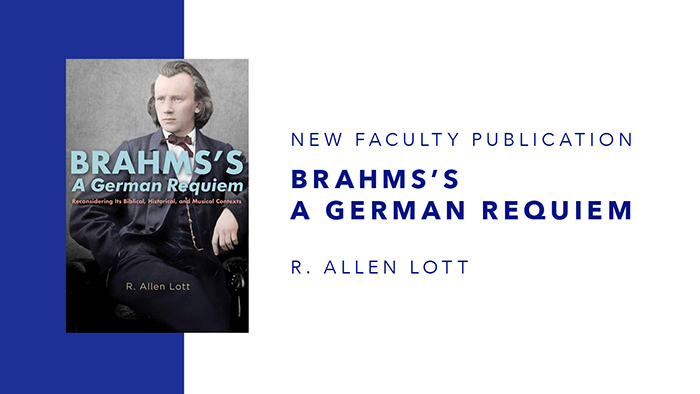Lott argues in new book for Christian perspective of Brahms’ ‘Requiem’

A new book by R. Allen Lott, professor of music history at The Southwestern Baptist Theological Seminary, offers a new perspective to the scholarly consensus regarding the Christian nature of German composer Johannes Brahms’ famous piece, “A German Requiem.”
Published this month by University of Rochester Press, Brahms’s A German Requiem: Reconsidering its Biblical, Historical, and Musical Context refutes prevailing modern interpretations of Brahms’ masterpiece, composed between 1865 and 1868.
Lott says there has been a trend in scholarly commentary on Brahms’ “Requiem” that contends the composer presented an “intentionally vague” inclusive theology that is “deliberately written to accommodate any belief.” But Lott says his extensive research—as detailed in his book—proves the work’s Christian perspective on death, grief, and the afterlife.
The 500-page book is the culmination of about a decade’s work, but also reflects a lifetime of Lott’s work, experiences, and admiration for the German composer. Lott says he is honored to provide a more complete interpretation of Brahms’ “Requiem.”
“I do believe my entire life has prepared me to write about the work,” Lott says, “with my longstanding love for the music of Brahms, my entire life of engagement with the Bible, teaching sacred choral music at Southwestern Seminary for more than 30 years that helped provide a significant amount of context for my research, and my acquaintance with grief. I know personally what these beautiful, biblical words of comfort mean to believers.”
Lott says he hopes this new book will encourage music scholars, choral conductors, and music lovers to reconsider their own view of this work, which Lott says uniquely expresses the Christian view of and response to death: “finding comfort and hope in the resurrection and an eternity praising our Creator.”
Joseph R. Crider, dean of the School of Church Music and Worship, says Lott’s work reflects the school’s commitment to helping students develop a robust appreciation and knowledge of Western music, and navigate cultural expressions and worldviews in constant change.
“For years, musicologists and historians have been unwavering in their assessment of the Brahms ‘Requiem’ as a work espousing universalism,” Crider says. “Dr. Lott’s meticulous historical research and careful investigation of performances near the time it was composed reveal that this monumental musical masterpiece is specifically Christ-centered and Christ-honoring.”
“Any time long-held conventional assumptions are challenged, especially in the world of musicology, people take notice,” Crider says. “This work by Dr. Lott will garner significant attention, and the attention points to Christ.”



